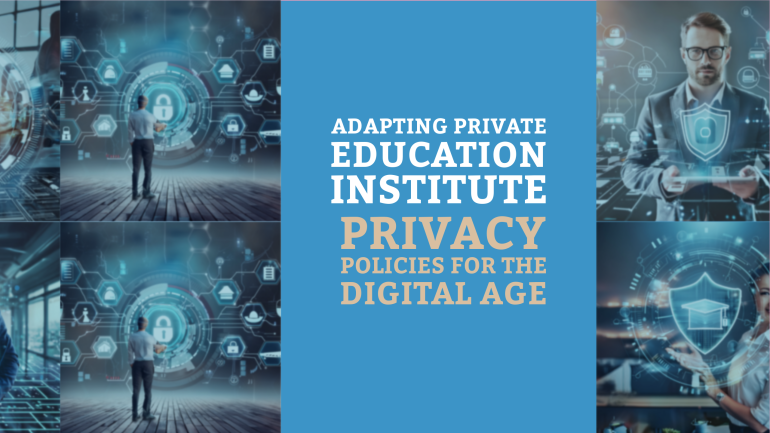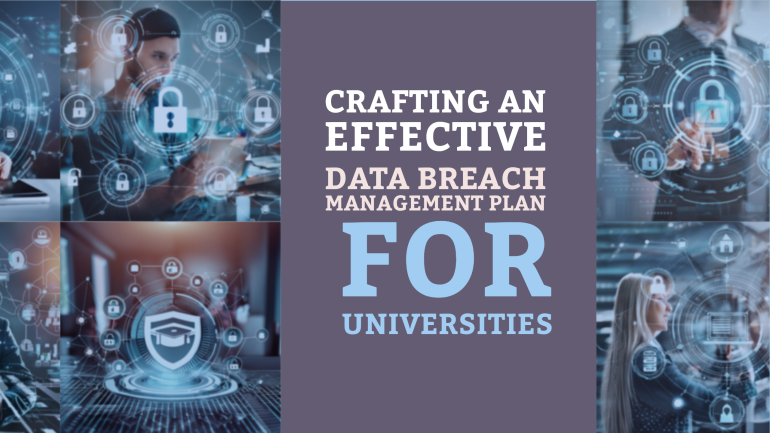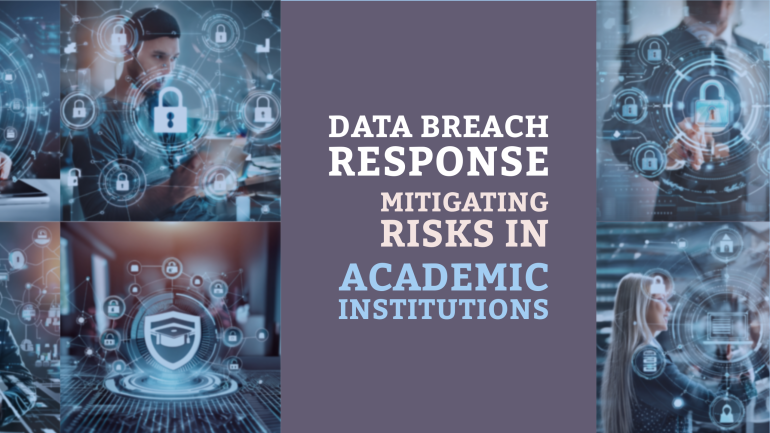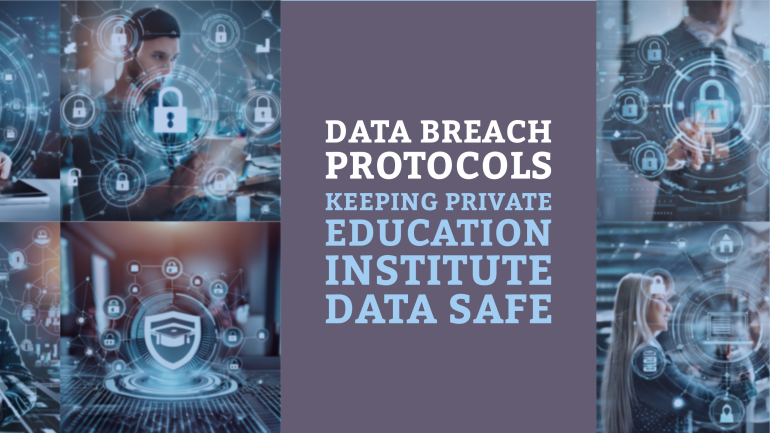This website uses cookies so that we can provide you with the best user experience possible. Cookie information is stored in your browser and performs functions such as recognising you when you return to our website and helping our team to understand which sections of the website you find most interesting and useful.
Table of Contents
You may also interested:
TL;DR: Adapting Private Education Institute Privacy Policies for the Digital Age
- Personal Data Protection: Private education institutes must prioritize protecting personal data such as student information, grades, and financial records in the digital age.
- Online Communication Guidelines: Establish clear guidelines on how to communicate electronically with students and parents to ensure privacy and security.
- Consent for Data Collection: Obtain explicit consent from individuals for collecting, storing, and using their data in compliance with data protection laws.
- Data Encryption and Security: Implement encryption and robust security measures to safeguard sensitive information from data breaches and cyber threats.
- Regular Policy Review: It is crucial to periodically review and update privacy policies to address evolving technologies and maintain compliance with privacy regulations.
Most private education institutes today face the challenge of adapting their privacy policies to keep pace with the rapidly evolving digital landscape. With the increasing use of online platforms, personal data security and privacy have become paramount concerns for students, parents, and educators. This blog post will explore the importance of updating privacy policies to address cyber threats, data breaches, and compliance with relevant regulations. By understanding the risks and best practices in safeguarding sensitive information in the digital age, private education institutes can enhance trust among stakeholders and protect their reputation.
Understanding Privacy Regulations and Standards
Overview of Current Privacy Laws
Standards for data protection have evolved significantly in recent years, especially with the increased use of digital technologies. Laws such as the General Data Protection Regulation (GDPR), the Health Insurance Portability and Accountability Act (HIPAA), and the Family Educational Rights and Privacy Act (FERPA) are crucial in ensuring the security and confidentiality of personal information.
In-depth Analysis of GDPR, HIPAA, and FERPA
Analysis of GDPR, HIPAA, and FERPA reveals their specific guidelines and requirements. GDPR focuses on protecting the personal data of individuals within the European Union, imposing severe fines of up to 4% of annual global turnover or €20 million (whichever is greater) for non-compliance. HIPAA safeguards the privacy and security of health information, while FERPA governs the privacy of student educational records. Understanding the nuances of these regulations is crucial for educational institutions to ensure compliance and protect sensitive data.
Crafting Effective Privacy Policies for Private Education Institutes
Essential Elements of a Privacy Policy
Effective privacy policies for private education institutes should clearly outline the types of personal information collected from students, parents, and staff. It should detail how this information is stored, used, and protected. Additionally, the policy should explain the purpose of collecting such data and who has access to it. Transparency is key in gaining trust from stakeholders.
Integrating Digital Considerations into Privacy Policies
Any privacy policy for a private education institute must address digital considerations in today’s tech-savvy world. This includes outlining how data is collected through online platforms such as websites, mobile apps, and learning management systems. Policies should also address the use of cookies, third-party services, and data encryption to ensure the security and privacy of personal information.
Digital technologies have revolutionized the way private education institutes operate, making it easier to access information and resources online. However, this also poses risks in terms of data privacy and security. Failing to address digital considerations in privacy policies can lead to breaches and potential legal implications. Therefore, institutes must stay updated on the latest digital trends and ensure their policies reflect these advancements.
Implementing Privacy Policies in the Digital Infrastructure
Educational Technology and Data Safety
Implementing robust privacy policies in private educational institutions is crucial in the digital age to safeguard sensitive student data. Your institution must prioritize data safety when utilizing educational technology, ensuring that all digital platforms comply with industry standards and regulations to protect student information from unauthorized access.
Training and Compliance for Staff and Students
To uphold privacy policies effectively, training and compliance programs must be implemented for both staff and students. These programs should educate individuals on the importance of data privacy and the protocols in place to maintain it. Ensuring comprehension and adherence to these policies is imperative for safeguarding sensitive information.
Educational institutions must emphasize the critical role that staff and students play in maintaining data security. Regular training sessions and compliance checks should be conducted to mitigate risks and ensure strict adherence to privacy policies. Non-compliance can result in costly breaches and damage to the institution’s reputation.
Ongoing Management and Updates of Privacy Practices
Regular Policy Review and Reassessment
Many private education institutes understand the importance of regular policy review and reassessment in order to ensure compliance with the latest privacy regulations and best practices. It is crucial to conduct periodic audits of existing policies to identify any gaps or areas that may need updating to address new privacy concerns.
Responding to Emerging Digital Threats and Opportunities
For private education institutes, staying abreast of emerging digital threats and opportunities is imperative in maintaining the security of sensitive information. Digital technologies continue to evolve rapidly, presenting both risks and possibilities for educational institutions. It is crucial to establish mechanisms for monitoring and responding to new threats, while also capitalizing on digital advancements to enhance data protection measures.
With cyberattacks becoming more sophisticated and prevalent, private education institutions must prioritize cybersecurity measures to safeguard student and staff data. Regular training programs and simulations can help ensure that faculty and staff are equipped to recognize and respond to potential threats effectively. Additionally, collaborating with cybersecurity experts can provide valuable insights into emerging threats and best practices for mitigating risks.
Final Thoughts
The Role of Educational Institutes in Protecting Privacy
To effectively protect the privacy of students and staff in the digital age, educational institutes must prioritize robust privacy policies and security measures. Educators should educate themselves on the latest privacy laws and technologies, implement secure data storage practices, and regularly review and update their privacy policies to address evolving threats.
Future Trends in Digital Privacy and Education
As technology continues to advance, the landscape of digital privacy in education will also evolve. Educational institutes must stay proactive in adapting to these changes by investing in advanced security systems, offering cybersecurity training programs, and collaborating with experts in the field of data protection.
Thoughts: With the increasing amount of personal data being collected by educational institutions, it is crucial to stay vigilant in safeguarding this information from cyber threats and breaches. By staying informed and proactive, educational institutes can continue to provide a safe and secure digital environment for their students and staff.
FAQ
Q: Why is it important for private education institutes to adapt their privacy policies for the digital age?
A: It is crucial for private education institutes to adapt their privacy policies for the digital age to ensure the protection of sensitive student information in an increasingly digital world.
Q: What are some key considerations when adapting privacy policies for the digital age?
A: When adapting privacy policies, private education institutes must consider compliance with data protection regulations, cybersecurity measures, data encryption, and transparency in data collection and usage.
Q: How can private education institutes enhance data security in the digital age?
A: Private education institutes can enhance data security by implementing robust cybersecurity protocols, conducting regular security audits, providing staff training on data protection, and utilizing encryption tools to safeguard sensitive information.
Q: What are the implications of not updating privacy policies for private education institutes?
A: Failing to update privacy policies can lead to data breaches, legal consequences, loss of trust from students and parents, and damage to the reputation of the institute.
Q: How can private education institutes ensure transparency in data collection and usage?
A: Private education institutes can ensure transparency by clearly communicating their data collection practices to students and parents, obtaining consent for data processing, and providing options for individuals to manage their privacy settings.





